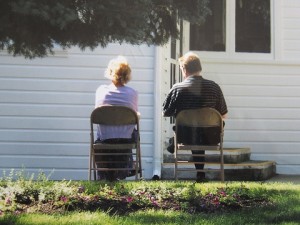My son Hans and his Katy are energetic gardeners. Wanting to teach Nicholas, Evelyn and Thomas the principles of sowing and reaping, they devoted part of their pretty yard to growing vegetables and berries. This week we’ve all benefited from Katy’s delicious cooking, enjoying leeks, onions, strawberries, currants, and other foods from the yard.
Then today Katy planned to harvest the first of an abundant carrot crop, their green tops standing tall and lush. With trowel at-the-ready, she showed the children the plump, orange carrot tops peeking out of the black soil. But when she pulled out the first few, we got a terrible surprise. Each one was nearly as wide as it was long, some virtually spheres, and most were split down the middle with grey gunk in the cracks.
And then we saw the reason: SLUGS.
Thousands of them had been banqueting on Nyman carrots for weeks. As we sliced into the carrot-crevices, slimy blobs wriggled and writhed, objecting to being disturbed. Many of the carrots included hollows in which hundreds of eggs had been laid. The word “gross” wasn’t disgusting enough.
Katy ran for the gardening book while Hans made the decision to uproot all 7 rows of healthy-looking carrot plants. As he dug and tugged, he tossed the uprooted carrots into two piles: contaminated and partially-contaminated.
The children carefully carried the partially-contaminated to a table, where I used a sharp knife to trim away whatever “clean” bits could be used. Then they rubbed off the soil and plopped them into a tub of clean water to go to the kitchen.
What could have been a bountiful carrot crop turned out to be a big bust for a family who had weeded, watered, and anticipated a harvest from April through August. But God saved the day with a spiritual lesson.
As Hans pulled out one foul carrot after another, lamenting the loss, he suddenly said, “This is probably a parallel to what our ‘righteous’ works look like to God. At the end of days, as the Lord combs through our good deeds, he’ll be tossing them into two piles: ‘Contaminated and partially-contaminated.’ Not one will be flawlessly righteous.”
We can easily fool ourselves into thinking our good deeds are boosting our credit with him. But as learned theologians remind us, we’re all sinners, and we’ll always be sinners, to the very end. It’s healthy to remind ourselves of that so we won’t be tempted to classify our behavior as “pretty good.”
The happy truth is we’re saved by God’s grace through faith in him, not by anything we do to earn it. (Ephesians 2:8-9) As Bishop Ryle says, even in our best works, there’s something to be pardoned.
Tonight we ate the carrot pieces shaved from contaminated carrots, but Katy’s plans for carrot soup, carrot cake, carrot bread, and other goodies preserved in her freezer will not materialize.
But in 2013, WATCH OUT slugs!
“We are all infected and impure with sin. When we display our righteous deeds, they are nothing but filthy rags,” (…or contaminated carrots). (Isaiah 64:6)






